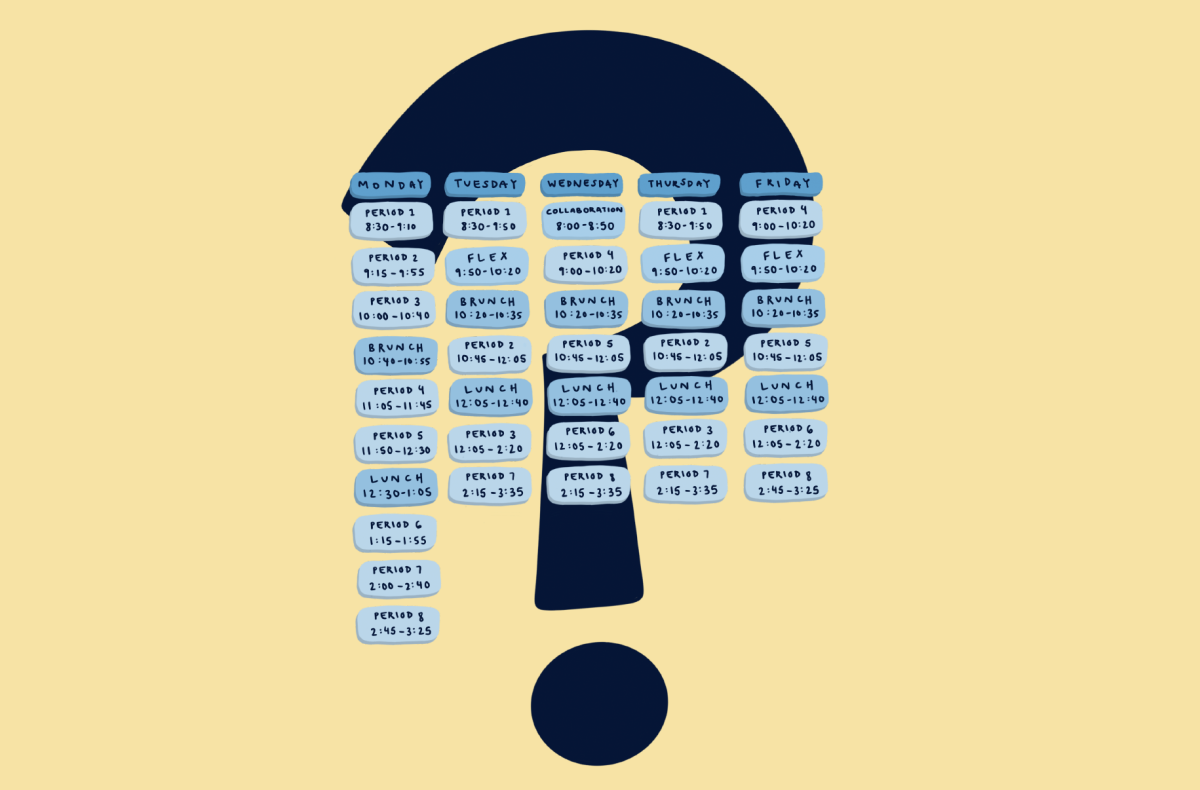On Friday, Jan. 12, 2024, teachers across FUHSD voted between the current seven-block schedule and a new eight-block schedule; there was a 45-55 split, with the majority favoring the latter.
After the vote, many students and teachers were concerned because the new schedule proposed several significant changes, including 25-minute tutorials and school days consistently ending at 3:35 p.m. However, the main point of contention is based on the mistaken belief that the vote between teachers means that the schedule will certainly be implemented next year. This is not the case, as it will not go into effect next year; the year of implementation remains uncertain.
“Our vote doesn’t mean it will happen,” FHS Instrumental Music Teacher and committee member, Joseph Kelly said. “Both sides actually have to agree. And so [teachers] still have input, but it takes the administration and the teachers’ union, those negotiators both have to agree. So yes, [the vote] only authorizes those negotiations; they can’t negotiate without directions from the teacher vote.”
In past years, FHS has progressed through numerous schedules. This year, the Bell Schedule Committee consisting of teachers, administrators and the President of the Classified Union, who represents custodians, secretaries and other members of the district, was tasked with drafting a new schedule that would address teachers’ complaints about early collaboration time and accommodate a new education requirement — an Ethnic Studies/Health course that will be required for freshmen, starting in the 2025-26 school year.
“The timeline that we were originally charged, the bell schedule committee was originally charged with in the fall was kind of condensed and accelerated because we wanted to be able to accommodate that decision early in the kind of schedule-making process for next year,” FHS history and social sciences teacher, Geoff Beckstrom, who represents FHS on the negotiation team of the FUHSD teachers union, said. “So that it could be implemented next year. And in fact, district management had asked us to do so.”
The committee met three times over a six-week period to discuss a schedule change, which was presented to the teacher’s union for a vote. Unlike previous committees, this one discussed the matter at an accelerated pace. For instance, after the COVID-19 shutdown, the district consolidated the schedules of all five FUHSD schools into one, which took over one year of deliberation. Kelly noted that the process of discussing a new bell schedule has become shorter over the years.
“That process [was] also a year and a half to two years,” Kelly said. “The current process has really been a semester. When I say it’s quicker than it has been previously, that’s the reference I’m making. And the question becomes, is it too quick or not?”
The committee considered various factors while creating schedules. One of them was that the introduction of a new mandatory ethnic studies class, combined with a rise in singletons — classes offered only one block in a day — due to declining enrollment, would leave little space for freshmen to take elective and language classes. Because of the recent decline in enrollment, some classes have lost popularity and are only offered in one block. Consequently, when students are interested in multiple singletons that conflict with each other, they must choose one. Beckstrom said an eight-block schedule would mitigate this problem..
“So, a block schedule gives a little bit more flexibility to schedule makers to move things around, so that we can maintain a robust offering of all those classes,” Beckstrom said.
A common misconception about the new schedule is that students can take up to eight classes. However, the maximum number of classes a student can take under the new schedule is still seven. While the eight-block schedule provides flexibility for counselors to make schedules, with up to three free blocks, a substantial number of students will be left with “holes” in their schedules.
“Most students would say okay, I either want the last two periods of the day off so I could leave early or a mixture of early and late, but we can’t guarantee that,” FUHSD Associate Superintendent Tom Avvakumovits said. “That means in third block instead of having maybe 50 kids who don’t have a class, which might be the case now and I don’t know, the number of students that have an open second block might move to 200 kids.”
Having mid-day gaps, when students often opt to stay on campus, raises logistical concerns.
“We don’t know if we had 200 kids with an open period during second block,” Avvakumovits said. “Does that create a problem? Where do they go? We can’t fit them in the library. Do we create different spaces and what are the expectations of students who have open periods so that was another concern.”
Along with accommodating students, the new schedule also aims to help teachers.
The current schedule for teachers includes a one-hour collaboration period twice a week before school starts. During these sessions, each teacher meets with their respective department. In contrast, the proposed eight-block schedule aims to allow teachers within the same department to have a common free period, which would be an ideal time for collaboration. With the eight-block schedule, teachers would not have to begin their workday earlier than 8:30 a.m..
“It’s been shared with me that [the current collaboration time] is very difficult on a segment of our teacher population,” Avvakumovits said. “Wouldn’t it be better if we can say your freshman biology team could meet in the school day so we can schedule that all of them have, say, a third block off and then maybe all the ninth grade English teachers could have fourth block off and, that way, in the day they can get together and talk about ‘Okay, how can we improve our instruction for students?’”
Notably, the free periods given to teachers may not be synchronized among different schools. This may adversely affect certain departments, particularly those in which teachers collaborate across schools due to being the only teacher in the department in their respective school.
“So for me, it’s going to isolate me more,” FHS French teacher Janene Rich said. “I probably won’t be able to easily find a way to collaborate with other French teachers and so my collaboration hours will be spent on something site-wise, that may not be as valuable for my classes.”
The new schedule’s 3:35 p.m. dismissal time may inconvenience some employees with young children who rely on daycare services, creating a stressful work-parenting balance.
Although it may cause difficulties for some, the revised dismissal time can be beneficial for athletes. With the earlier dismissal time, athletes who participate in outdoor sports such as soccer and softball can leverage the daylight without having to leave early from their last class.
While students and teachers may have different opinions on the proposed schedule’s dismissal time, they all share the same concern about the shorter 25-minute tutorials. During tutorials, teachers often take the time to teach supplemental lessons, administer make-up tests and help students with their assignments. The shorter period undermines this effort.
“I don’t like it at all. It’s because 25 minutes is not enough to actually get work done to where you were productive,” FHS junior Kennedy Buchner said. “25 minutes is like, you set up your stuff, you get in the mindset, you have to scan in. So then you’re left with like 15 minutes of actually doing work.”
The proposed new schedule includes shorter 80-minute blocks instead of the current 90-minute schedule. Some teachers are not worried about the loss of instructional time and believe that they can adapt to the new schedule. However, others are concerned about the possibility of having more homework or facing additional learning challenges.
“I was thinking about how if you take 10 minutes out of each day, that’s gonna start adding up to where you’re losing time,” Buchner said. “For APs, [teachers] have a set curriculum they have to get through. So if they can’t teach in class, they’re gonna assign more for homework. So for those AP classes, they might just like not teach that last unit trying to make sure that students understand the most important units for the AP test and then [students are] gonna have to study it outside of school, which is going to be so annoying.”
While potential benefits to this schedule change exist, concerns such as the loss of instructional and 25-minute tutorials require further exploration. On Wednesday, Jan. 24, 2024, FUHSD Superintendent Graham Clark wrote an email to all staff, announcing that, despite popular belief, the schedule will not be implemented in the 2024-25 school year.
“We need time to continue to examine some of the issues mentioned above before we commit to this schedule,” Clark wrote.
In order to address concerns regarding the implementation of an eight-block schedule in the district schools, Avvakumovits has been asked to facilitate a process that may involve examining various areas of concern, such as drafting a “sandbox” course schedule at each school to determine if common preparations for course-alike teams are feasible, and assessing how many students’ schedules will have holes.
The district staff will also consider visiting and having conversations with other school districts that have already implemented the eight-period day.
By the end of May, it is expected that there will be more clarity on whether or not the eight-block schedule can be implemented for the 2025-26 school year.










